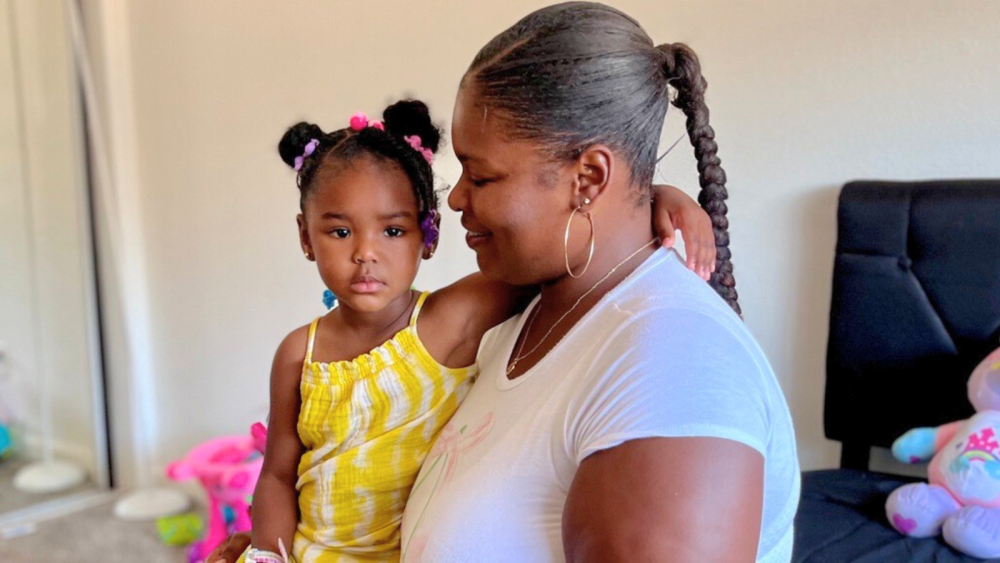Outreach Efforts Are Changing Lives For San Diegans Experiencing Homelessness

Shaneece Williams has a new outlook on life. The 29-year-old mother is going back to school with plans to study psychology. Her focus remains on her two-year-old daughter, Lanyah, who Williams said is already a big talker and people person.
“We’re adventurous,” said Williams. “She (Lanyah) likes to be outside and out and about pretty much anywhere.”
Williams said Lanyah enjoys going to community events – especially if there is face painting involved.
“The Park After Dark where they’re doing little events in San Diego,” Williams said. “Like free events for kids – movies at the park, or Civita Park is good because they have the water splash.”
Life has not always been like this for the young mother and daughter. Williams got the keys to a new home in June, after living on and off the streets for the last two years. She recalls how hard it was to be a single mother with no support system.
“I had a six, seven, month old – I had just had a baby – and nobody is here to tell me how to be a mom,” Williams said. “All I knew was I needed to make sure she was safe and inside that was always my main thing.”
Williams was between jobs and trying to get hotel rooms whenever possible. She said it was tough to think about the future while she was living day-to-day.
“It was like, I can’t even think about getting an apartment down the line,” Williams said. “I have to worry about, ‘OK checkout is at 11 a.m., what are we going to do?’”
That’s where City-funded outreach teams come in. It wasn’t until Williams connected with one of these teams in May of this year that she found hope again.
“Ever since then everything just flowed,” she said. “Everything just started coming together.”
Thanks to a state of California Encampment Resolution Fund grant, the City was able to deploy outreach teams near City Heights where Williams was staying. She got connected with People Assisting the Homeless San Diego (PATH) who helped get her and Lanyah get into supportive housing.
“I never was judged not one time or anything like that,” Williams said. “I really felt cared for and like I had help – these people are here to help me.”
PATH San Diego Outreach Specialist Jordan Searls helped Williams get ready for housing. That included help with appointments, documents, even getting shoes for job interviews.
“We were struggling because she (Shaneece) was outside, sleeping wherever she could in friend's cars, on the street, couches – wherever,” Searls said. “When I saw Shaneece it was like, ‘Oh you have a one-year-old daughter – we need to get you indoors.’”
It took about a month for Williams to find housing after connecting with outreach teams. Priority is given to individuals and families who are deemed particularly vulnerable. Williams’ journey to end her homelessness was not easy, but there was one constant.
“My daughter kept me going,” Williams said. “She helped me find me; I’m never going to look back.”
Williams is focusing on her daughter, school and landing a full-time job. She does want others experiencing homelessness to know there is help available.
“No matter what – or how long you have been down – there is help out here,” Williams said. “There are resources, and there are people that can help you. No matter what they’re going through – we love and we care about them – I feel like some people need to know that.”
Growing up in the foster system, Williams wants to work with foster youth and even potentially open her own resource center in the future. She continues to receive outreach assistance to ensure housing stability.
“They didn’t just leave me because I got into housing,” Williams said. “I still call Jordan like, ‘Can you print this off for me, can you help me with my resume,’ – And they make it happen.”
Outreach plays a vital role in ending homelessness. It can take multiple touches to gain trust and figure out what kind of help is needed. In fiscal year 2024 (FY24), City-funded outreach teams served more than 6,800 people, with 405 people connected to permanent or other forms of long-term housing.
The City also funds a Family Reunification Program, which is operated by the Downtown San Diego Partnership. The program aims to connect those experiencing homelessness with family or friends who are able to help provide stable housing. In FY24, just over 500 people were placed into housing from this program.
